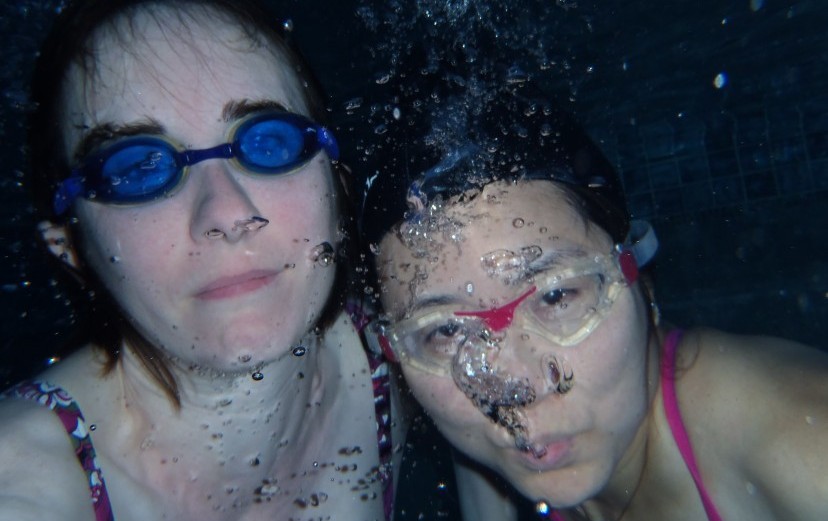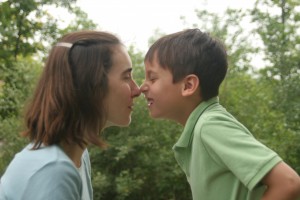
Parenting  When I attended the Friendship Circle’s Mom’s Night Out during the summer, I brought my waterproof camera to the pool. My friends and I spent the evening laughing about taking pictures of each other jumping into the pool and swimming underwater - the photos were not flattering at all, but provided a great opportunity for fun.
Some might say that small talk and goofing around are not meaningful, but mental health professionals agree that these interactions decrease isolation and increase well-being.
When I attended the Friendship Circle’s Mom’s Night Out during the summer, I brought my waterproof camera to the pool. My friends and I spent the evening laughing about taking pictures of each other jumping into the pool and swimming underwater - the photos were not flattering at all, but provided a great opportunity for fun.
Some might say that small talk and goofing around are not meaningful, but mental health professionals agree that these interactions decrease isolation and increase well-being.
 Because we were all working toward the same goal, I felt accepted and respected. Acceptance is a two-way street: because I felt accepted, I was able to function as a productive and supportive member of the group. When we accomplished our goal, we celebrated together. Finding a class, volunteer group or activist group not only provides topics for conversation, but also the sense of inclusion that everyone needs.
Because we were all working toward the same goal, I felt accepted and respected. Acceptance is a two-way street: because I felt accepted, I was able to function as a productive and supportive member of the group. When we accomplished our goal, we celebrated together. Finding a class, volunteer group or activist group not only provides topics for conversation, but also the sense of inclusion that everyone needs.
Handle With Care: 8 Ways Special Needs Parents Can Make Friends
I am not an expert on friendship. In fact, I have a history of many failed friendships. But I keep trying, because friendship is the one thing that I value most at this point in my life. Even though I keep insisting that I’m really an introvert who doesn’t know anything about making and keeping friends, I often get comments and questions like these:- “Maybe you could share some ideas on how special needs parents can be a friend to someone with ‘typical’ kids.”
- “I am drawn to clues that build relationships. I want to be seen as friendly and playful.”
- “How about what not to say, or what to say, to a special needs Mom? Or how can I help a special needs Mom?”
- “There are all of these articles for people to better understand how to be a friend to special needs parents, but there's nothing that helps special needs parents with how to be friends with someone whose kids are typical.”
An Emotional Minefield
Friendship can be an emotional minefield between parents of children with special needs and parents of children without disabilities. I know that I experience a mixture of joy and sadness when friends and family members rattle off their children’s many accomplishments and milestones. On the other side, parents of typical children have confided in me that they don’t know how to approach or what to say to a parent of a child with a disability...so they usually say nothing. To complicate matters further, when a child’s disability is discussed among friends, there is a tendency to dismiss it:- “Oh, but all kids do that.”
- “He looks fine to me!”
- “That’s nothing to worry about, my child is much more medically involved. She’s had 4 grand mal seizures and 2 emergency room visits so far this month - and we had to replace the toilet after she clogged it with toys again!”
- “At least he can talk!”
How To Make a Friendship Work
In his philosophical dialogue On Friendship, Cicero points out that the Latin word for friendship, amicitia, comes from the word for love, amor. Friendship is a spirit of goodwill between two people; ability and disability don’t figure into that definition. There are pitfalls, of course. I know how those mistakes happen, because I’m guilty of them all. Fortunately, with a little bit of forethought and a lot of afterthought, there are ways to make a friendship between a special needs family and a non-special needs family work.1. Start with light conversation
Not every conversation among friends needs to be deep and soul-baring. I try to think of 2 or 3 positive, light-hearted comments to say, and even that can be challenging for me at times. After spending most of my life baffled by small talk on topics like the weather or movies, I came to realize that it is actually a social cue that opens up conversations. When I attended the Friendship Circle’s Mom’s Night Out during the summer, I brought my waterproof camera to the pool. My friends and I spent the evening laughing about taking pictures of each other jumping into the pool and swimming underwater - the photos were not flattering at all, but provided a great opportunity for fun.
Some might say that small talk and goofing around are not meaningful, but mental health professionals agree that these interactions decrease isolation and increase well-being.
When I attended the Friendship Circle’s Mom’s Night Out during the summer, I brought my waterproof camera to the pool. My friends and I spent the evening laughing about taking pictures of each other jumping into the pool and swimming underwater - the photos were not flattering at all, but provided a great opportunity for fun.
Some might say that small talk and goofing around are not meaningful, but mental health professionals agree that these interactions decrease isolation and increase well-being.
2. Know the difference between a friend and a psychotherapist
Some parents of children with disabilities, such as myself, prefer to cut to the chase and talk about what’s really important. Over-sharing and interrogating are common conversational tactics among some of us, but it puts others on the defensive. If you find it necessary to apologize for unloading your worries and venting your frustrations every time you talk with a friend, then it may be time to schedule an appointment with a counselor to work through your issues.3. Keep explanations short and sweet
Parents of typical children are sometimes puzzled by the things I do for my children. Although I know that I do not owe them an explanation, I found that saying something like, “He needs extra help with ____,” puts them at ease and opens up the possibility of developing the relationship further.4. Find a common cause
My most amazing experience with parents of typical kids happened when I was recruited to help write grant proposals for a new playground at my son’s school. Because we were all working toward the same goal, I felt accepted and respected. Acceptance is a two-way street: because I felt accepted, I was able to function as a productive and supportive member of the group. When we accomplished our goal, we celebrated together. Finding a class, volunteer group or activist group not only provides topics for conversation, but also the sense of inclusion that everyone needs.
Because we were all working toward the same goal, I felt accepted and respected. Acceptance is a two-way street: because I felt accepted, I was able to function as a productive and supportive member of the group. When we accomplished our goal, we celebrated together. Finding a class, volunteer group or activist group not only provides topics for conversation, but also the sense of inclusion that everyone needs.
5. Reciprocity
I received the following comment on one of my articles: “These same parents -- the ones who spend years unable to maintain the basest elements of the social contract, who forget reciprocity is an important element in relationships -- are baffled as to why their formerly close friends desert them. They aren't seeing the forest for the trees.” For many years, I was unable to reciprocate hospitality among friends and social groups. I still have difficulty coordinating hospitality when we have out of town guests, because of daily demands at home. But there are other ways to reciprocate in friendship:- Take an hour to treat a friend for coffee while the kids are at a scheduled activity
- Offer to include your friend’s family in a field trip, or to swap siblings for a short period
- Invite a friend for a walk at a park
- Offer a service or creative solution to a problem that is troubling your friend - my friends are always surprised that I have therapeutic lesson plans, educational activities and out-of-the way field trip destinations in the back of my head
- Explain that your family situation makes it difficult to reciprocate in the usual manner, but that you are open to other ideas



